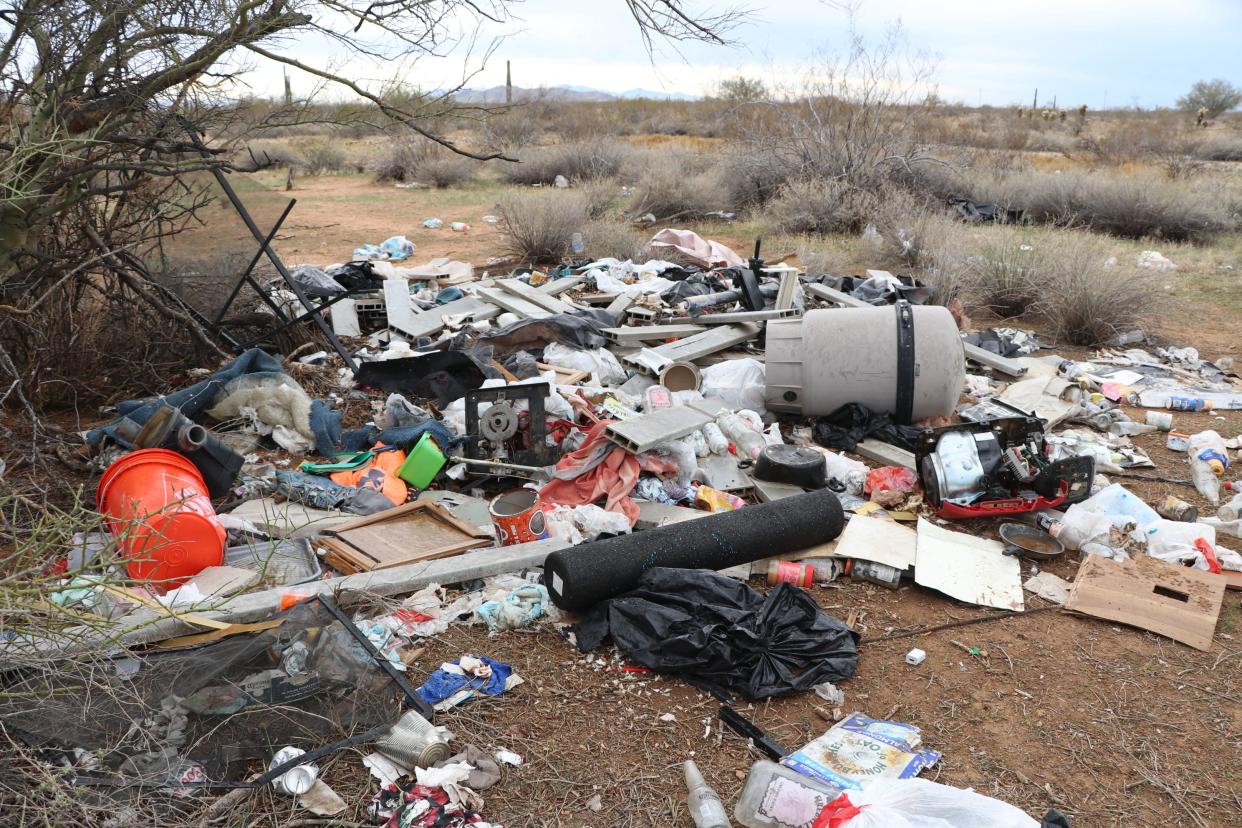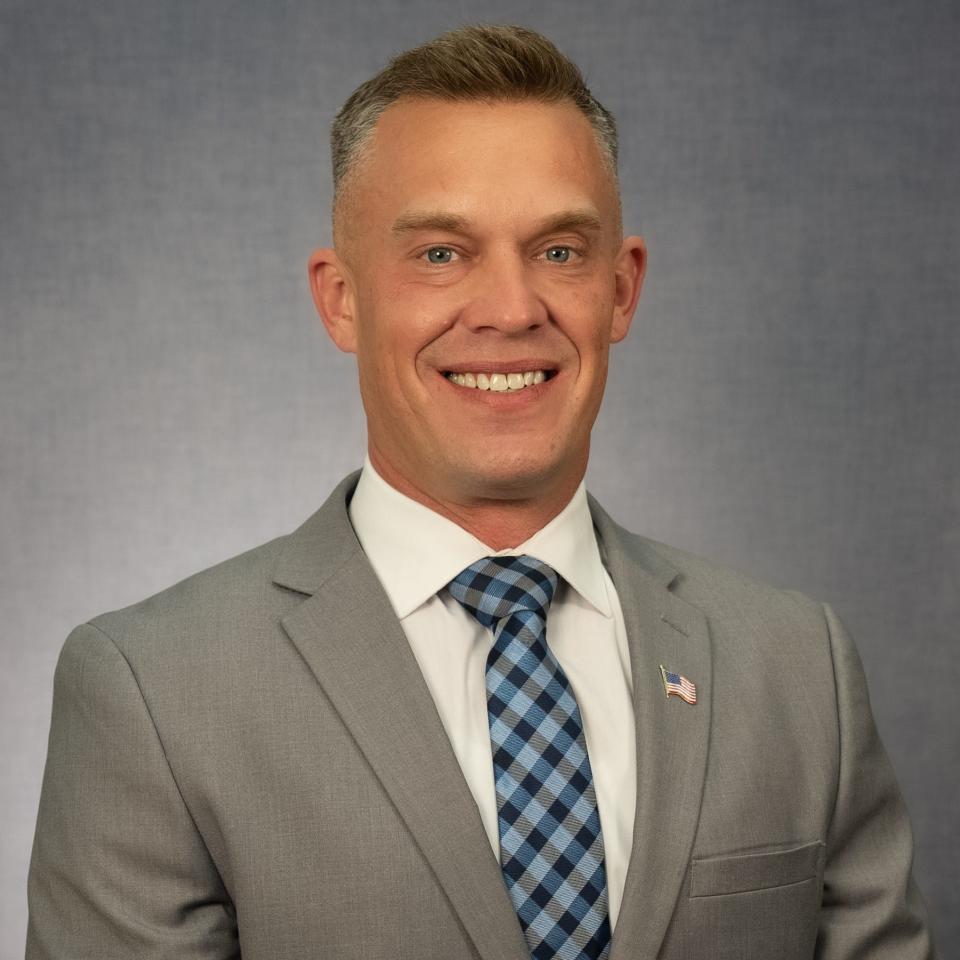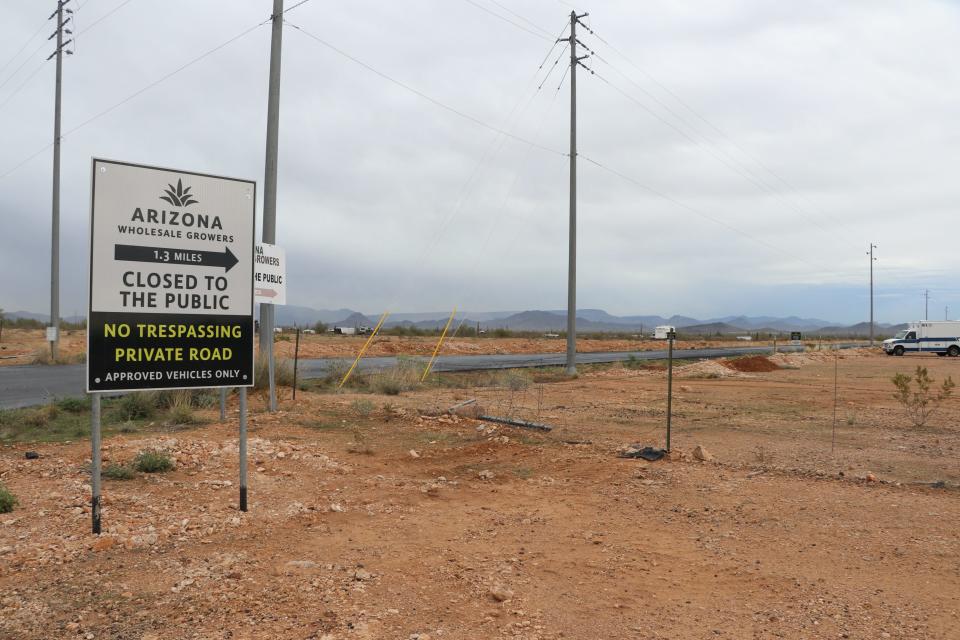Peoria tackles unpermitted camping, dumping on State Trust Land near Lake Pleasant

Corrections & Clarifications: Peoria Vice Mayor Jon Edwards' first name was misspelled in an earlier version of the article.
At a plant nursery near Lake Pleasant last June, farming supplies started to go missing. One day it would be a watering hose. The next day it was a shade cloth and then tree stakes.
For the employees of Arizona Wholesale Growers, it wasn’t immediately obvious what had been happening. That was until they went to use a tractor only to find that its wheels had been removed.
The company’s 80-acre farm isn’t open to the public and is located down a 1.3-mile stretch of Maddock Road, just off New River Road. It’s a private street, dotted with signs that warn against trespassing.
The remote area of the north Valley is considered Arizona State Trust Land, overlapping both the city of Phoenix and the city of Peoria. Much of the land west of New River Road is in Peoria’s jurisdiction, while the area east of the road falls under Phoenix city limits.
Near the farm there, a man camping had been gradually building a shelter for himself out of the nursery’s supplies.
“He took the wheels off it and dragged them to the desert and used them as weights,” Shawn Cox, Wholesale Growers’ general manager, said, adding, “The only way we knew (it was our stuff) was because our name was on the wheels.”
When Cox confronted the individual hoping to retrieve their belongings, the man became irate, prompting Cox to call police. He was allowed to take the tires back, but nothing else. The company's name on them was the only proof he had to show they belonged to the farm.
In another instance with a different camper who was trying to drive over the company’s retention ditches, Cox got into an argument after asking the person to stop filling in the drain, which is used to avoid flooding.
In recent months, Cox said, he’s talked to a few campers living in the surrounding State Trust Land — likely without a permit or beyond the 14 days Arizona’s Land Department allows. For some, he’s asked them to stop taking the company’s property, and to others, he’s advised them not to ditch their trash in the desert.
“People leave their tents behind and leave their mattresses behind,” Cox explained. “(Campers will) leave, and a day later, you’ll see people out there picking out their junk, like scavenging out what’s left behind.”
It’s occurrences like these that have gotten the attention of elected officials in Peoria and Phoenix.
Peoria’s Councilmember Brad Shafer and Vice Mayor Jon Edwards are spearheading a task force comprising members of the city manager’s office, code compliance, the Peoria Parks and Recreation and Police departments.
Together, they’ve been coordinating talks with Councilmember Ann O’Brien of northern Phoenix, the Phoenix Police Department, and Arizona State Land Department officials. Their charge is to draw up solutions to tamp down unpermitted camping and littering.
“We want people to come camp and hike,” said Shafer, who represents the Mesquite District, an area of northern Peoria that includes the recreational space surrounding Lake Pleasant. “We want all that, but we want people to be respectful and take care of our desert.”

Assembling the task force
Recently, Shafer’s seen an excess of camping around his district — largely, he acknowledges, because of the pleasant weather, relative to the Valley’s unforgiving summers.
Though not having an issue with people enjoying the outdoors, some campers, he said, are overstaying their welcome, continuing to camp for longer than the Land Department’s 14-day period on overnight visits.
Furthermore, Shafer continued, “We’re seeing them leave trash in the desert and dumping sewage in the desert. And I have found two abandoned vehicles that have been stripped as well. So, at the end of the day, there’s a bunch of trash.”
The Arizona State Land Department requires those camping on State Trust property to purchase a recreational permit, valid for a year. While the department grants permit holders unlimited day-use access during the year, it caps overnight camping to no more than 14 cumulative days.
The department also requires permit holders to not leave trash behind at their campsite.
“Some of those campers who are here for recreation are very responsible. They take care of the campsite. They don’t leave their trash behind. They’re doing a great job,” Shafer said.
Others though, he’s noticed, are not as considerate. and are likely to stay much longer than two weeks.
“I’ve seen huge water containers ... which tells me they’re going to be there a long time,” he said.
To address the concerns, the council-led task force was assembled to have the local police and code compliance divisions work with the State Land Department on enforcing camping regulations, Peoria Deputy City Manager Mike Faust said.
“We're evaluating options,” Faust said of the early stages of the task force. “Really the first thing that comes is how can we look at volunteer police or some other option of going out and just checking permits, doing an education piece.”
Echoing the comments on an educational approach, Councilmember Edwards said the city wants to first inform campers of the regulations and show them the steps of getting a permit.
“We want people to enjoy the area as long as they're following the rules,” he said.
During a recent visit Peoria, Phoenix and land department officials took to the State Trust property, they talked to 25 people, Faust said. Of the 25, 24 of them had permits to camp. The other individual was able to simply go online and pay for the permit.
“If they're still there without a permit or beyond the 14 days, then State Land would have to be contacted, and then they, State Land, engages P.D. to initiate trespass,” Faust explained.
Statewide, four field investigators respond to complaints and inquiries, but they are not able to patrol for checking permits, said Land Department spokesperson Lynn Córdova.
“The investigators are not sworn peace officers so they must rely on local law enforcement for assistance,” she said in an email, adding, “Local law enforcement has every right to take enforcement action on State Trust Land, especially when it comes to local ordinances.”
Enforcement and education
With State Trust property falling under the Land Department’s jurisdiction, police officers from Peoria and Phoenix can respond to calls for service and can ask to check campers’ permits. But as Faust noted, officers must first contact State Land regarding suspected trespassers.
Peoria Police Lt. Mike Faith is assigned to the northern part of the city, from Bell Road to Lake Pleasant, and oversees the department’s off-road vehicle program.
He said over the coming weeks, the department will take an education-first approach, so the public is aware of what’s allowed on the State Trust property.
“Our goal is to go out there to first make contact, see if they have a permit, meet permit restrictions and guidelines,” Faith said, adding, “It’ll be a case-by-case basis, but we want to start enforcing that 14-day rule, so people aren’t creating a situation where it’s unsightly, unsanitary for other people.”
Part of that education effort, according to Faith, is informing campers that once those 14 days are up, they can’t just relocate several feet away and purchase another permit.
“That might be something that is perceived by them but not actually in law,” he said.
Another component will include offering resources to those experiencing homelessness, Faith said.
“The city of Peoria has made that a foundation of our community engagement, if you will, so we understand what they’re going through and then provide them resources if we can,” Faith said.
Where are the campers coming from?
Those camping on the land are out there for a variety of reasons, the city officials noted.
Mostly, they’re out-of-town visitors looking to camp recreationally. Some are believed to be contractors for the nearby semiconductor manufacturing complex. Others are urban, nomadic campers traveling and living out of vans.
“Social media and various other outlets have made it a trendy thing to do,” Faith said. “‘I’m going to get in my RV and live my life the nomadic way.’”
Another tent of campers, however, are people struggling and have lost their housing, like 54-year-old William Brackett.
For the past few days, he’s been camping in an RV with his wife and five dogs in an area near New River Road and Carefree Highway.
He said they are in between homes and plan to camp there until early March, when they’ll hopefully be able to drive east to his wife’s hometown of Wisconsin. The move comes after years of getting pricked “by the cactus,” a colloquialism he shared, but using more colorful language.
Brackett and his wife were recently evicted from their home following a dispute with their landlord over a black mold issue. They’ve since been living in the RV that someone gave them the day of the eviction, and can’t find another rental because of exorbitant pet fees.
“Nobody else would take us because of our dogs,” Brackett said. “I mean, if they do take you, they want almost $1,000 a month … For people living in an RV, if you’re living in an RV, you can’t always afford the amenities of life.”
Much of their belongings are in storage, waiting to be loaded in a van Brackett intends to purchase for their move to the Midwest. The couple, he said, has a house waiting for them.
“We just don't have the money to get up there,” Brackett said.
Where to dump the junk
Asked for his observation on any litter, Brackett said he hadn’t noticed much trash where he’s been camping. He mentioned that he intends to dispose of his refuse properly when they’ve accumulated enough.
Finding out where that is poses some complications though as Brackett’s truck got a flat tire not long after setting up camp.
“I was gonna go down to the gas station … and ask them where we could take it. They might know,” he said. “They might say, ‘Just throw it in here if you don't have a bunch,’ because I know they got dumpsters. Some places let you do that. Some places say, ‘Don't you do that!’”
Employees of the nearby Minute Mart and Shell gas station off Lake Pleasant Parkway said campers oftentimes come in to ask where they can dump their trash. Their response, however, is simply that they’re unaware of a location.
Many other campers, the employees said, just unload their garbage in the station’s dumpster, which is prohibited. One of the cashiers said they’re constantly telling campers not to do it again after they’ve been caught.
At least one bright spot in the issue, another cashier noted, is the campers are throwing their trash in a receptacle rather than leaving it in the desert.
The Land Department doesn't place receptacles for campers to use "because campers are supposed to remove their own trash," said the Land Department's Córdova.
Though unsightly litter is something the task force wants to address, Faust emphasized that campers are not usually the source of the garbage. What the officials found, he said, is that the campers are “pretty respectful” of the land.
“Usually, when we have littering in desert landscape, it's usually just people dumping and it's not the direct result of these campers,” Faust said. “At least that's not what we found.”
Nonetheless, littering remains an issue for Peoria police, said Faith, who added that some officers have “enjoyed going up there and cleaning that area up because we want the desert to be accessible to everybody.”
As far as clearing up piles of garbage that officials find, that takes a collaborative effort.
“If there are a fair amount of people out there and trash, we’re going to work with our partners to get that trash cleaned up, whether that be city dumpsters to clean that up,” said Faith, who was unable to quantify how much trash has been hauled.
In the past, Shafer explained, the city has worked with either volunteers from nonprofits or the police department to remove the garbage.
Though the work gets done to clean up the areas, Shafer said he’s hoping the task force can find a more sustainable option.
“You can pick up trash but then the trash comes back,” Shafer said. He added: “That’s what we’ve done in the past … this time, we're trying to look at long-term solutions”
Both the city of Peoria and the State Land Department have various cleanup and abatement funds in their budgets to address the litter, according to Faust. The city of Peoria had not yet responded to a request on how much it spends for such cleanup efforts as of this posting.

Long-term goals
Grateful to be working with her counterparts in Peoria and the State Land Department, Councilmember O’Brien, Phoenix’s District 1 representative whose area borders Shafer’s district, stressed the early nature of the task force.
“I will tell you it’s a little too early at this stage, there’s still a lot of data to collect and look at, before we discuss possible solutions,” said O’Brien.
Her office, she said, wants to know how often camping permits are generated and how many people camp on the State Trust land.

From February 2023 through January 2024, the department issued 29,394 recreational permits, according to Córdova. The average number of recreational permits sold over the previous two calendar years, she said, was 27,405.
Revenue off those recreational permit sales, amounted to $494,320 in 2022 and $521,945 in 2023, according to Córdova.
For Cox, he said he wants people to continue camping in the area and traversing the hiking and riding trails nearby. He just wants visitors to take care of those amenities.
“I know that we’re farmers and it’s our thing to care about the plants and the habitat out there, but I hope people find that it’s a good place to hike, an interesting place,” he said. “I hope it’s not destroyed by a few bad apples. I hope they find it worthwhile to keep protecting.”
Shawn Raymundo covers the West Valley cities of Glendale, Peoria and Surprise. Reach him at sraymundo@gannett.com or follow him on X @ShawnzyTsunami.
This article originally appeared on Arizona Republic: Peoria battles unpermitted camping, dumping near Lake Pleasant

